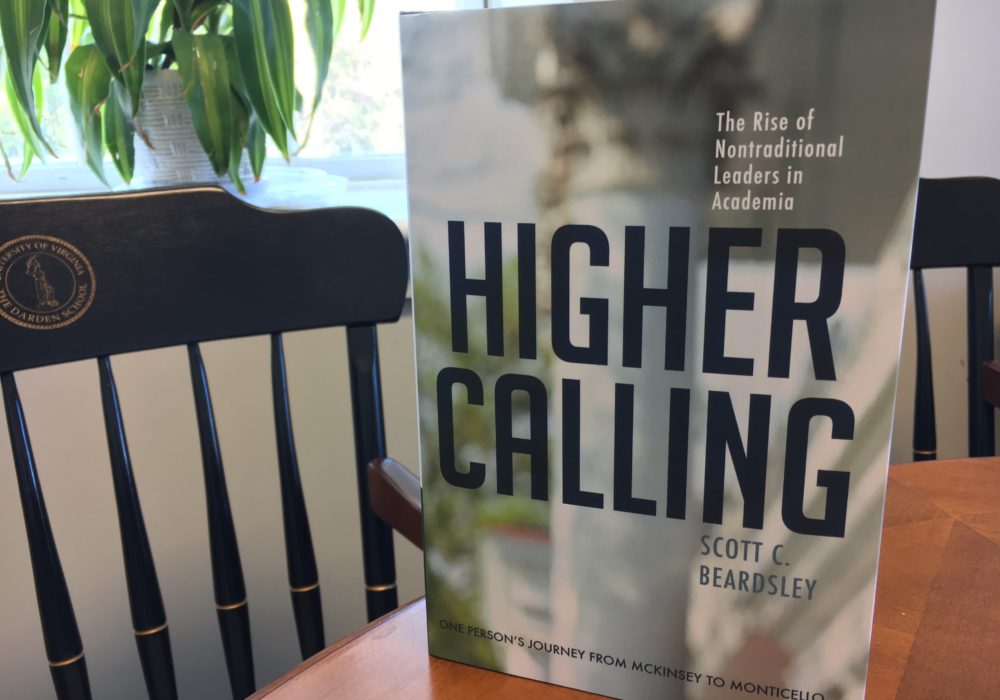When Darden School Dean Scott Beardsley released his book Higher Calling: The Rise of Nontraditional Leaders in Academia earlier this year, I immediately added it to my reading list. Having executed my own transition to higher education, I was anxious to learn about Dean Beardsley’s journey. More importantly, however, “second acts” are a very hot topic for us in Alumni Career Services. Many of our alumni clients are leaving, or considering leaving, lengthy and highly successful careers. But for a variety of reasons, they aren’t quite ready to hang it up.
While Higher Calling specifically discusses a transition to higher education, Dean Beardsley’s lessons can be broadly applied. Here are a few that stood out to me:
Transitions require strengths. In order to make partner at McKinsey, where Dean Beardsley spent 26 years prior to his transition, one must produce a “self-authored impact summary,” which, among other metrics, is reviewed by McKinsey’s Principal Candidate Election Committee. If you are fortunate enough to work for an employer that prioritizes people development and requests such tasks from you, great. Take these exercises seriously. If not, consider taking such an exercise upon yourself. A clear understanding of how you add value will not only help you advance in your current organization, but will help you to conceive of — and articulate — how you will add value when and if you decide to transition. Employers look for relevant skills, of course, but it is easy to argue that a track record of achievement is equally important — rock stars tend to succeed wherever they land. Dean Beardsley was not considering leaving McKinsey because he was struggling or trying to escape a bad situation, but was rather pursuing a calling. Transitions are more easily made from a position of strength. If you find yourself in a position of weakness, consider addressing the underperformance first.
Transitions require heart. Late in the dean’s career at McKinsey, he was faced with a difficult decision of becoming head of McKinsey’s Americas telecom practice, or becoming “the leader of all McKinsey consultant learning programs worldwide.” I can definitely understand the dilemma. While at Goldman Sachs, I observed that senior leaders were extraordinarily wary of giving up any part of their commercial portfolios, even if doing so enabled them to be better leaders. Conventional wisdom suggests that disconnecting oneself from revenues makes one vulnerable. Ultimately, Dean Beardsley followed his heart and accepted the people development role, which kick-started a journey opening new doors and possibilities. If you have passion for what you do, you have a much greater chance of success in your current organization and beyond.
Transitions require time. Says Dean Beardsley: “It is probably best that I did not suspect how difficult and time consuming the transition would be.” While the implication is that he may not have pursued the transition had he suspected, what we, the readers, can infer is that transitions can be glorious but are not something you think about only when they are necessary. We should always be thinking about the directions of our businesses, our careers and our lives, and recalibrate often. My favorite career book, Designing Your Life, suggests revisiting some of its exercises on an annual basis, comparing such recalibration to “rotating your tires” and “[changing] the batteries in your smoke detectors.” Transitions, as Dean Beardsley aptly points out, require extensive research and often times the closing of “credentials gaps.” The dean pursued a doctorate in higher education management at Penn while serving as a senior partner at McKinsey … across the Atlantic. It is hard to come up with any personal excuses when considering the enormity of this task. When there is a will, there is a way, but it isn’t going to be easy. Or fast.
Transitions require an open mind. Another parallel between Higher Calling and Designing Your Life is a philosophy that transitions are not necessarily direct; they may take a couple of tries, or a couple of steps. This concept surely resonates with me. My transition was a two-step process, the first of which was a complete and utter fail. But if it weren’t for the first step, I might not have opened my mind to the second, which has been one of the most fulfilling steps forward of my life. Says Dean Beardsley: “If I can offer any lesson to others thinking of pursuing a second chapter, it is that one should not expect a linear, logical process that begins with clear view of the outcome and ends with accomplishing that. It is more like a maze in which you will explore many options, and in which serendipity will play its part.” In Designing Your Life, the authors suggest: “For every step forward, it can sometimes seem you are moving two steps back. An important part of the process is letting go … And sometimes amazing designs can emerge from the mess.”
If you would like a sounding board or guidance as you consider a second act, no matter your career stage or time horizon, we want to hear from you! Please reach out to ACS to speak to a coach.





